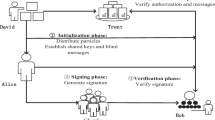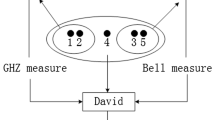Abstract
In this paper, we show a new quantum proxy blind signature scheme based on single particle superdense coding. We only need perform unitary operator on single qubit to blind 2-bit classical information. The scheme also satisfies the properties of blindness, unforgeability and undeniability. It has a wide application to e-payment, e-voting, e-government, and etc.

Similar content being viewed by others
References
Yang, Y. G., Zhou, Z., Teng, Y. W., et al.: Arbitrated quantum signature with an untrusted arbitrator. European Phys. J. D 61(3), 773–778 (2011)
Niu, X. F., Zhang, J. Z., **e, S. C., et al.: A practical e-payment protocol based on quantum multi-proxy blind signature. Commun. Theor. Phys. 70(5), 529–533 (2018)
Gottesman, D., Chuang, I.: Quantum digital signature. ar**v:quant-ph/0105032v2 (2001)
Wen, X. J., Niu, X. M., Ji, L. P., et al.: A weak blind signature scheme based on quantum cryptography. Opt. Commun. 282(4), 666–669 (2009)
Xu, G. B.: Novel quantum proxy signature without entanglement. Int. J. Theor. Phys. 54(8), 2605–2612 (2015)
Fatahi, N., Naseri, M., Gong, L. H., et al.: High-efficient arbitrated quantum signature scheme based on Cluster states. Int. J. Theor. Phys. 56(2), 609–616 (2016)
Chaum, D.: Blind signature for untraceable payments. Advances in Cryptology. In: Proceeding of crypto82, New York. pp. 199–203 (1983)
Mambo, M., Usuda, K., Okamoto, E.: Proxy signatures for delegating signing operation. In: Proceedings 218 of the 3rd ACM conference on computer and communications security, New Delhi. pp 48–57 (1996)
Chen, Y. Z., Liu, Y., Wen, X. J.: A quantum proxy weak blind signature scheme. Chinese J. Quantum Electron. 28(3), 341–349 (2011)
Cao, H. J., Yu, Y. F., Song, Q, et al.: A quantum proxy weak blind signature scheme based on controlled quantum teleportation. Int. J. Theor. Phys. 54 (4), 1325–1333 (2015)
Tian, J. H., Zhang, J. Z., Li, Y. P.: A quantum multi-proxy blind signature scheme sased on genuine four-qubit entangled state. Int. J. Theor. Phys. 55(2), 809–816 (2016)
Niu, X. F., Zhang, J. Z., **e, S. C.: A quantum multi-proxy blind signature scheme based on entangled four-qubit Cluster state. Commun. Theor. Phys. 70(1), 43–48 (2018)
Xu, G. B., Wen, Q. Y., Gao, F., et al.: Novel multiparty quantum key agreement protocol with GHZ states. Quantum Inf Process. 13(12), 2587–2594 (2014)
Wang, T. Y., Ma, J. F., Cai, X. Q.: The postprocessing of quantum digital signatures. Quant. Inf. Process. 16(1), 19 (2017)
Niu, X. F., Zhang, J. Z., **e, S. C., Chen, B. Q.: A third-party E-payment protocol based on quantum multi-proxy blind signature. Int. J. Theor. Phys. 57(8), 2563–2573 (2018)
Shor, P. W., Preskill, J.: Simple proof of security of the BB84 quantum key distribution protocol. Phys. Rev. Lett. 85(2), 441–444 (2000)
Mayers, D.: Unconditional security in quantum cryptography. J. ACM 48(3), 351–406 (1998)
Lo, H. K.: A simple proof of the unconditional security in quantum key distribution. J. Phys. A. 34(35), 6957–6967 (2012)
Inamon, H., Lutkenhaus, N., Mayers, D.: Unconditional security of practical quantum key distribution. Eur. Phys. J. D. 41(3), 599–627 (2007)
Shao, A. X., Zhang, J. Z., **e, S. C.: A quantum multi-proxy multi-blind-signature scheme based on genuine six-qubit entangled state. Int. J. Theor. Phys. 55(12), 5216–5224 (2016)
Cao, H. J., Zhang, J. F., Liu, J, et al.: A new quantum proxy multi-signature scheme using maximally entangled seven-qubit states. Int. J. Theor. Phys. 55(2), 774–780 (2016)
Zeng, C., Zhang, J. Z., **e, S. C.: A quantum proxy blind signature scheme based on genuine five-qubit entangled state. Int. J. Theor. Phys. 56(6), 1762–1770 (2017)
Wang, M.L., Ma, W.P., Wang, L.L., et al.: A quantum proxy group signature scheme based on an entangled five-qubit state. Modern Phys. Lett. B 29(28), 150173 (2015)
Wen, X.J., Tian, Y., Ji, L.P., et al.: A group signature scheme based on quantum teleportation. Phys. Scr. 81(5), 055001 (2010)
Guo, W., **e, S. C., Zhang, J. Z.: A novel quantum proxy blind signature scheme. Int. J. Theor. Phys. 56(5), 1708–1708 (2017)
Zhang, J.: Quantum proxy signature scheme with EPR entangled states. Telecommunications Science. (2012). https://doi.org/10.3969/j.issn.1000-0801.2012.11.s016
Acknowledgements
This work is partially supported by the National Key R&D Program of China (Grant No. 2017YFB0802400), the National Science Foundation of China (Grant No. 61373171,61702007), the 111 Project under (Grant No. B08038)
Author information
Authors and Affiliations
Corresponding author
Additional information
Publisher’s Note
Springer Nature remains neutral with regard to jurisdictional claims in published maps and institutional affiliations.
Rights and permissions
About this article
Cite this article
Niu, XF., Ma, WP., Chen, BQ. et al. A Quantum Proxy Blind Signature Scheme Based on Superdense Coding. Int J Theor Phys 59, 1121–1128 (2020). https://doi.org/10.1007/s10773-020-04393-5
Received:
Accepted:
Published:
Issue Date:
DOI: https://doi.org/10.1007/s10773-020-04393-5




